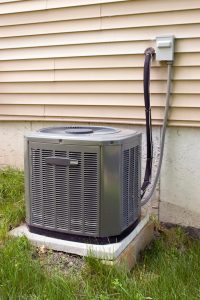
Spring is here, which means that warmer temperatures have arrived and you’re probably making more use of your air conditioner in order to keep your home comfortable. That trend will continue as spring turns to summer, and any unusual activity with your air conditioner needs to be addressed now, before the mercury in the thermometer rises too high.
One of the most common – and commonly misunderstood – signs of a problem with your air conditioner is the presence of frost or ice on the evaporator coils. Most people either dismiss it out of hand – isn’t the air conditioner supposed to be cold? – or try to scrape the ice off themselves, both of which are huge mistakes. Frost on the coils almost always indicate a problem with your air conditioner, but scraping the ice off never helps. It will just re-form and if you aren’t careful, the effort will damage the coils themselves (turning an often-easy repair job into a very expensive operation). Instead, you should always shut the system town and call for a repair service. It helps to understand how frost forms and why it’s a problem in the first place.
The Air Conditioning Cycle
Centralized air conditioners rely on refrigerant to do their jobs, circulating through an endless loop of valves and coils in the system. A compression array first shifts the refrigerant gas into liquid form and subjects it to a great deal of pressure before moving it to the evaporator coils. An expansion valve releases a set amount of the refrigerant into the coils, where it shifts back into gaseous form and pulls heat from the nearby air in the process. The gaseous refrigerant then returns to the start of the system to start the cycle again.
It’s a very delicate system, and when problems arise, that balance can be thrown off easily. The most common is leaking refrigerant, but it can also involve problems with the fan motor, elevated levels of humidity or problems with the valve itself.
The Effects of Frost and Ice on the Coils
Regardless of the cause, when frost forms on the coils, it represents lost cooling potential as well as forming a barrier between the refrigerant and the air it’s trying to cool. That makes it much harder for the air conditioner to do its job. It will take longer to cool your home, the cost of running it will go up, and the added strain on other components will heighten the chances of a more serious breakdown occurring in the near future. The problem will only worse as time goes on. More frost and ice will build up, the strain will increase and the system will be force to work increasingly hard: raising costs until a full-bore breakdown occurs.
If you spot frost on your coils, turn the system off immediately, and call in a repair service to a proper professional company to diagnose and fix the issue. In Fredericksburg, TX, quality air conditioning repair can be conducted by D’Spain Sales & Service, Inc.





















